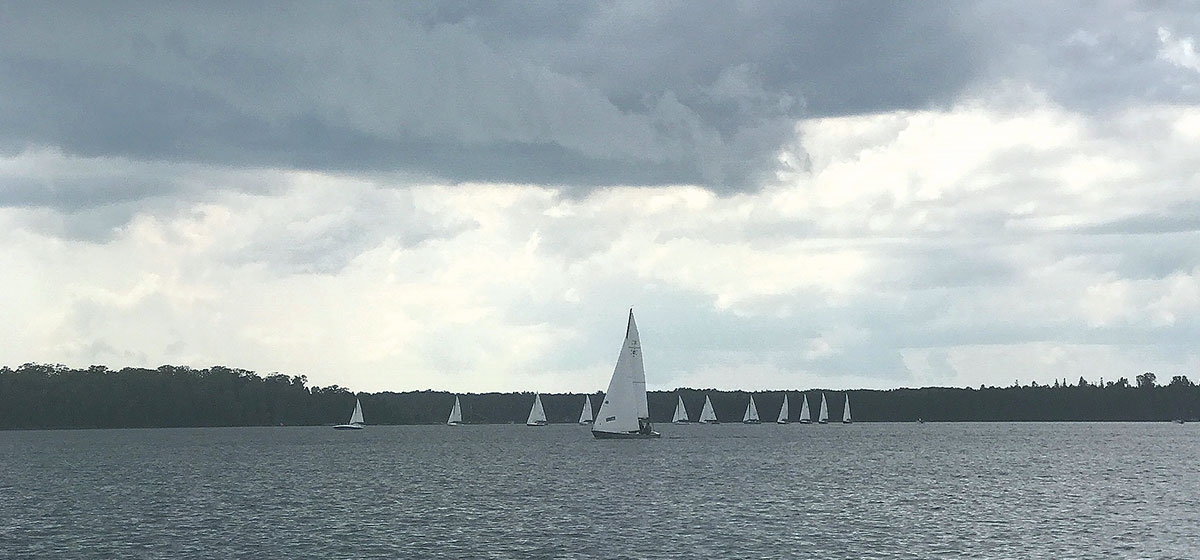Sailing into the Fray

In May, my older sister emailed, wondering if I’d be sailing in the nationals, which this year would be where we spend summers in Michigan. I’d been considering it, but there were two impediments—pulling together a four-man crew and the spinnaker. No problem with the crew, but flying a spinnaker loomed in my mind like a monster.
The spinnaker is the colorful balloon sail you see in the glorious photos of sailboat races. On a downwind racing leg, you launch the enormous “chute” and it pulls you along.
It’s a troublesome sail, though, and I hadn’t flown one in years. It has to be carefully packed in a bag and launched in a certain way to avoid the seemingly inevitable twists and tangles. And then there’s the possibility in a heavy wind of the weird and violent “death roll,” in which you rock from side-to-side, take on water and run the risk of sinking.
I replied that I would probably not be doing the nationals. “Too bad,” she emailed. “It would have been so worth it.” What it would be was a grueling ordeal. But I inquired what she meant: why would it be “so worth it?” She replied: “To honor Dad.”
I hadn’t considered that. And it was persuasive. More than anyone, Dad created our local fleet of Pearson Ensigns, which is the biggest fleet in the biggest class of full-keeled sailboats in North America. Having 70 of them in our waters means terrific racing.
When you’re a kid and you’re racing a dinghy or a sunfish, it’s fun and intense in its own way. Ensigns are different. At 22 feet long and 3,000 pounds, when 20 of them converge on a starting line 40 yards wide, sailors yelling warnings, there’s nothing like it.
Dad was a much better sailor than I am. After four years on a destroyer in the Pacific during World War II, nothing the Great Lakes could throw at him—and they can be mighty rough —daunted him. He skippered a half dozen 300-mile Port Huron to Mackinac races and countless local regattas.
The first time I skippered our Ensign in the regatta, I was 18, Dad was 60, and not on the boat. After the first two days, I was in last place. On the last day, I feigned sickness, so Dad took over. It was a heavy north wind, and Dad took a different tack that lifted him to first place and into the path of the boat that only had to finish the race to win the regatta. Dad had right-of-way, and the other boat should have yielded. A tremendous crash ensued. The rigging got tangled, and our mast snapped and fell into the cockpit. My older brother jumped into the three-foot waves. Pandemonium reigned.
Racing isn’t for everyone. About 20 years ago, I hadn’t raced for years, and the question loomed whether to dive back into it or not. I ultimately rejoined the fray, figuring that if I didn’t, no one in the family could pass the skills to younger generations.
And so, over years, I rose from the bottom of the pack to the middle of the pack, learning lessons each race. In sailing, you generally finish where you deserve to finish.
This year, I entered the three-day August regatta feeling bold. I’d bought a new jib and had been studying tactics and strategies. Our boat, the fleet’s oldest with hull number 24 of the more than 2,000 nationally, was responding well. And in the “B” division, which doesn’t use spinnakers, I was in third place for the season, just points out of second.
Day 1 was the weirdest race I’ve seen. What wind there was changed by the minute—as much as 180 degrees. Just one race due to the fluky winds, and we finished 7th of 14. Days 2 and 3 would tell the tale, with three races each day.
Day 2 the wind howled from the east, we donned yellow foul weather gear, and the rain came sideways. In the first race, our start was great, second across the line, and we soon passed the first-place boat.
Then it was time for another lesson. The outhaul broke, and the mainsail lost its shape and power. We chaotically dropped the main and made the repair, minutes ticking away. We finished last, but with one throwaway allowed, we were okay. Then, a metallic clank rang out, and the boat shuddered. After 55 years, a heavy metal shackle gave out, and the boom detached from the mast. Just like that, our season was over.
I suppose that sailors are nothing if not intrepid. And so, now that a few days have passed, I can laugh instead of grit my teeth as I mutter the loser’s refrain: “There’s always next year.”
And I am sailing in the nationals, on a friend’s boat.





